How Many Questions Are on the NCLEX? [2025]
Discover the number of questions on the NCLEX, including the minimum, maximum, and question types under the CAT format.
![How Many Questions Are on the NCLEX? [2025]](/_next/image?url=%2F_static%2Fblog%2Fquestions-nclex.png&w=3840&q=75)
How Many Questions Are on the NCLEX? Complete Guide to NCLEX Question Count
Are you wondering "how many questions are on the NCLEX?" You're not alone! This comprehensive guide explains everything you need to know about NCLEX question count, computer adaptive testing (CAT), and proven strategies to pass the NCLEX on your first attempt.
NCLEX Question Count: 85 to 150 Questions Explained
The NCLEX has between 85 to 150 questions, making it one of the most unique nursing exams you'll ever take. Unlike traditional fixed-length tests, the NCLEX uses Computer Adaptive Testing (CAT) to determine exactly how many questions you'll face.
Why Does the NCLEX Have Variable Questions?
The NCLEX question count varies because of its sophisticated Computer Adaptive Testing (CAT) system. This technology personalizes your exam experience by:
- Adjusting difficulty in real-time based on your performance
- Stopping when 95% confident about your nursing competency level
- Maximizing testing efficiency while maintaining accuracy
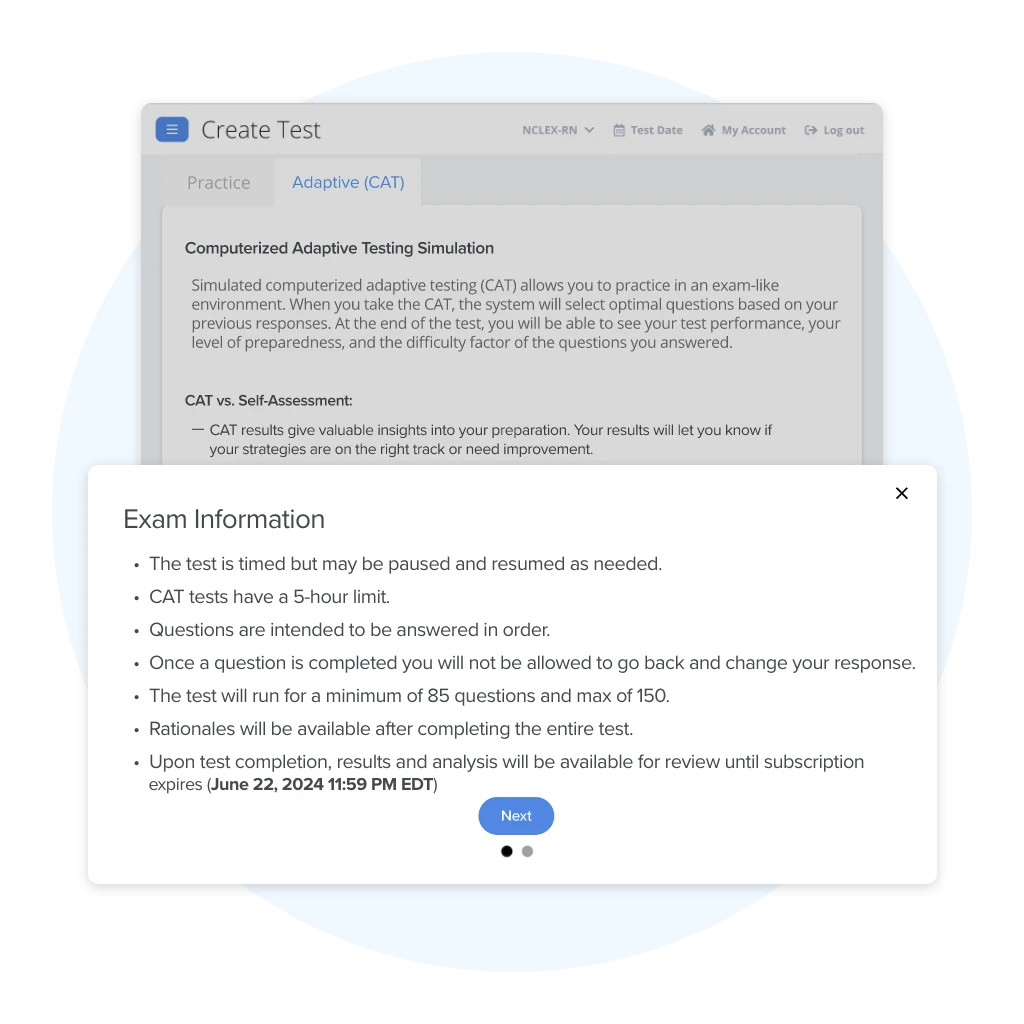
How NCLEX Computer Adaptive Testing (CAT) Works
Understanding NCLEX CAT is crucial for exam success. Here's exactly how it determines your question count:
NCLEX CAT Algorithm Process
- Start with medium difficulty questions
- Answer correctly? Next question becomes harder
- Answer incorrectly? Next question becomes easier
- Continue until 95% confidence is reached about your ability level
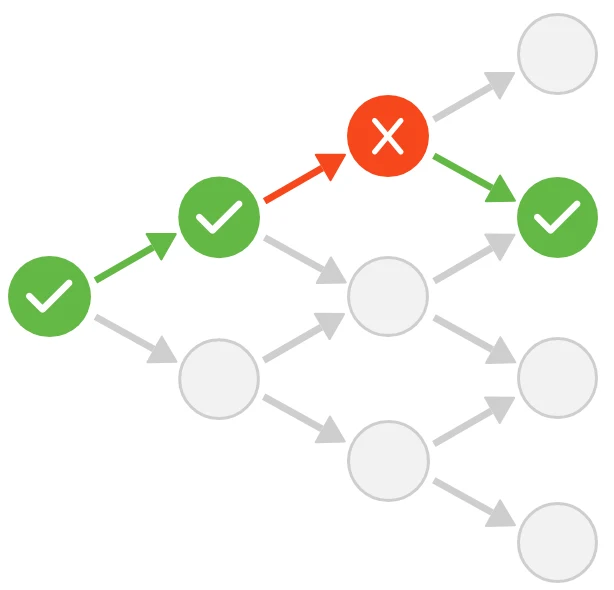
NCLEX Pass/Fail Rules
The NCLEX uses three specific rules to determine when you've answered enough questions:
95% Confidence Interval Rule (Most Common)
- Test stops when computer is 95% certain you're above or below passing standard
- Can happen anywhere from 85-150 questions
Maximum-Length Exam Rule
- Applies when your ability is very close to passing standard
- Computer administers all 150 questions before final determination
Run-Out-Of-Time Rule
- If you don't finish minimum 85 questions: automatic fail
- If you complete 85+ questions: final ability estimate determines pass/fail
NCLEX Content Areas: Complete Breakdown by Category
Your NCLEX questions will cover four main content categories with specific percentage distributions:
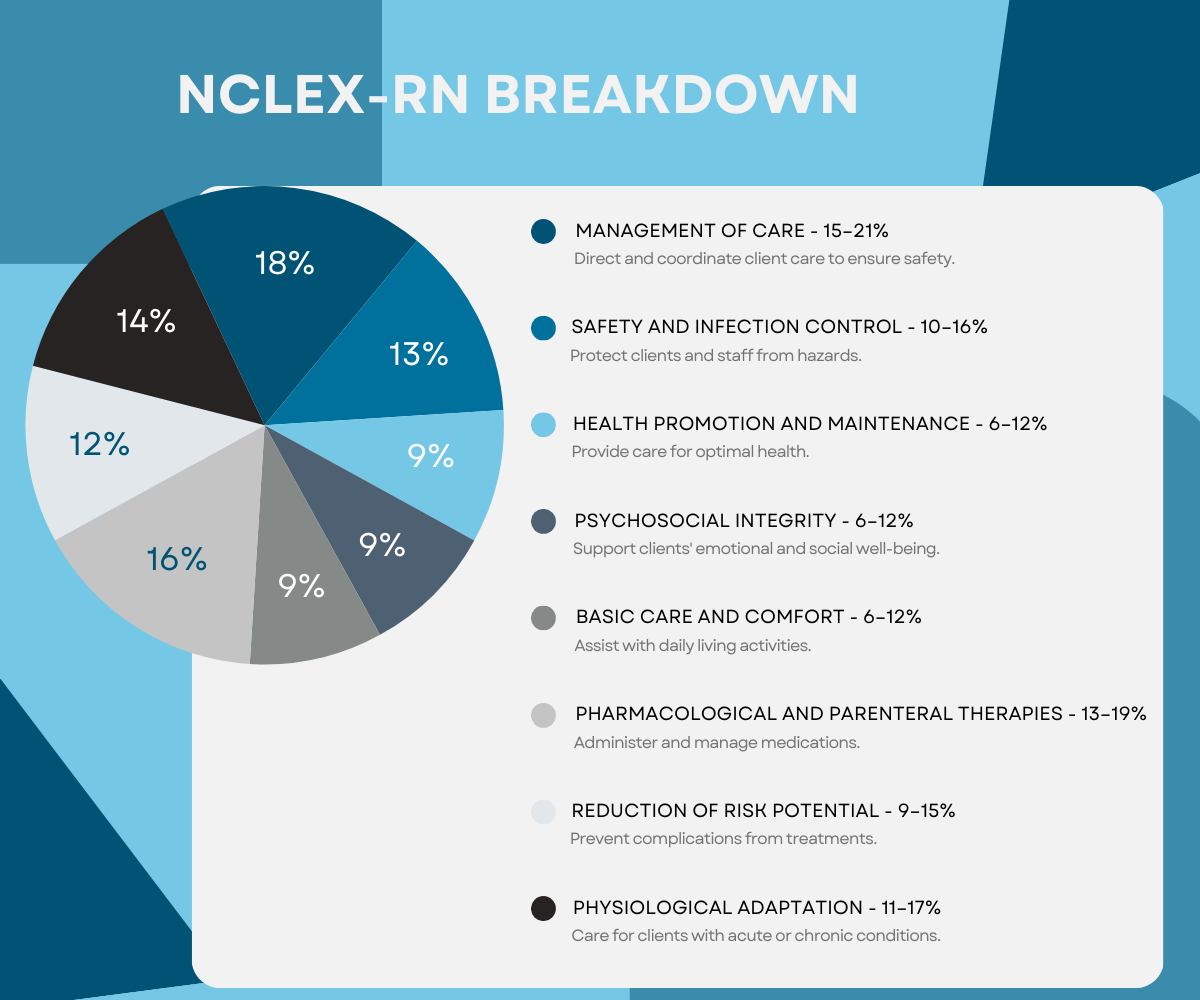
1. Safe and Effective Care Environment (26-38%)
- Management of Care (17-23%)
- Safety and Infection Control (9-15%)
2. Health Promotion and Maintenance (6-12%)
- Growth and development across lifespan
- Prevention and early detection of health problems
3. Psychosocial Integrity (6-12%)
- Coping mechanisms and adaptation
- Mental health concepts and therapeutic communication
4. Physiological Integrity (38-62%)
- Basic Care and Comfort (6-12%)
- Pharmacological and Parenteral Therapies (12-18%)
- Reduction of Risk Potential (9-15%)
- Physiological Adaptation (11-17%)
NCLEX Question Types and Formats: What to Expect
The Next Generation NCLEX (NGN), launched April 1, 2023, features diverse question formats that test your clinical judgment and nursing knowledge:
The Image shows the different types of questions available in the exam.

NCLEX Sample Question Examples
Below are examples of the types of questions you might encounter on the NCLEX. These include multiple response formats and nursing intervention selection questions, which test your ability to apply clinical judgment and prioritize patient care.
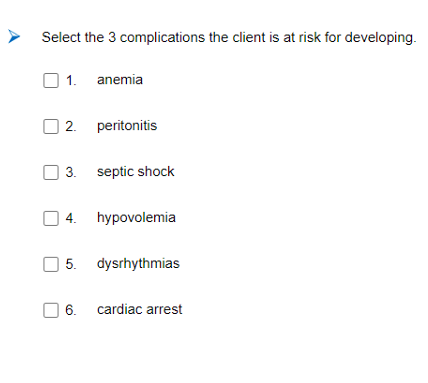
The multiple response question above requires you to select all options that apply, assessing your understanding of potential complications in a clinical scenario.
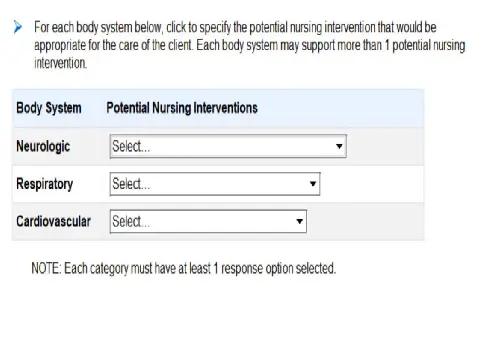
This nursing intervention selection example asks you to choose the most appropriate actions based on the patient’s needs— something that you'll have to do directly as a nurse.
Advanced NCLEX Question Formats and Scoring
The Next Generation NCLEX incorporates sophisticated scoring mechanisms:
Clinical Judgment Scoring
- Partial credit for partially correct responses
- Weighted scoring based on clinical importance
- Scenario-based evaluation across question sequences
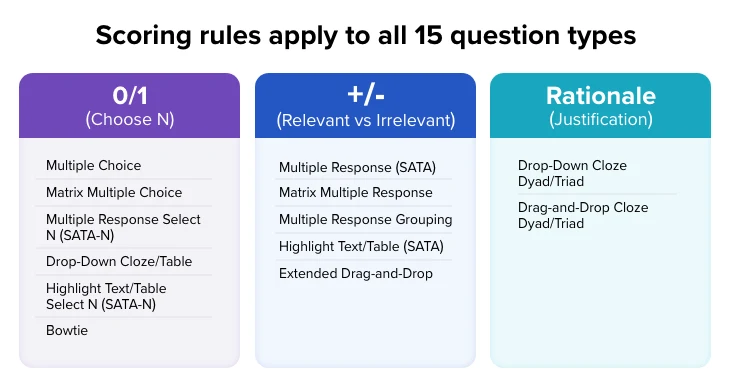
NCLEX Preparation Strategies: Study Smart, Not Hard
Effective NCLEX Study Methods
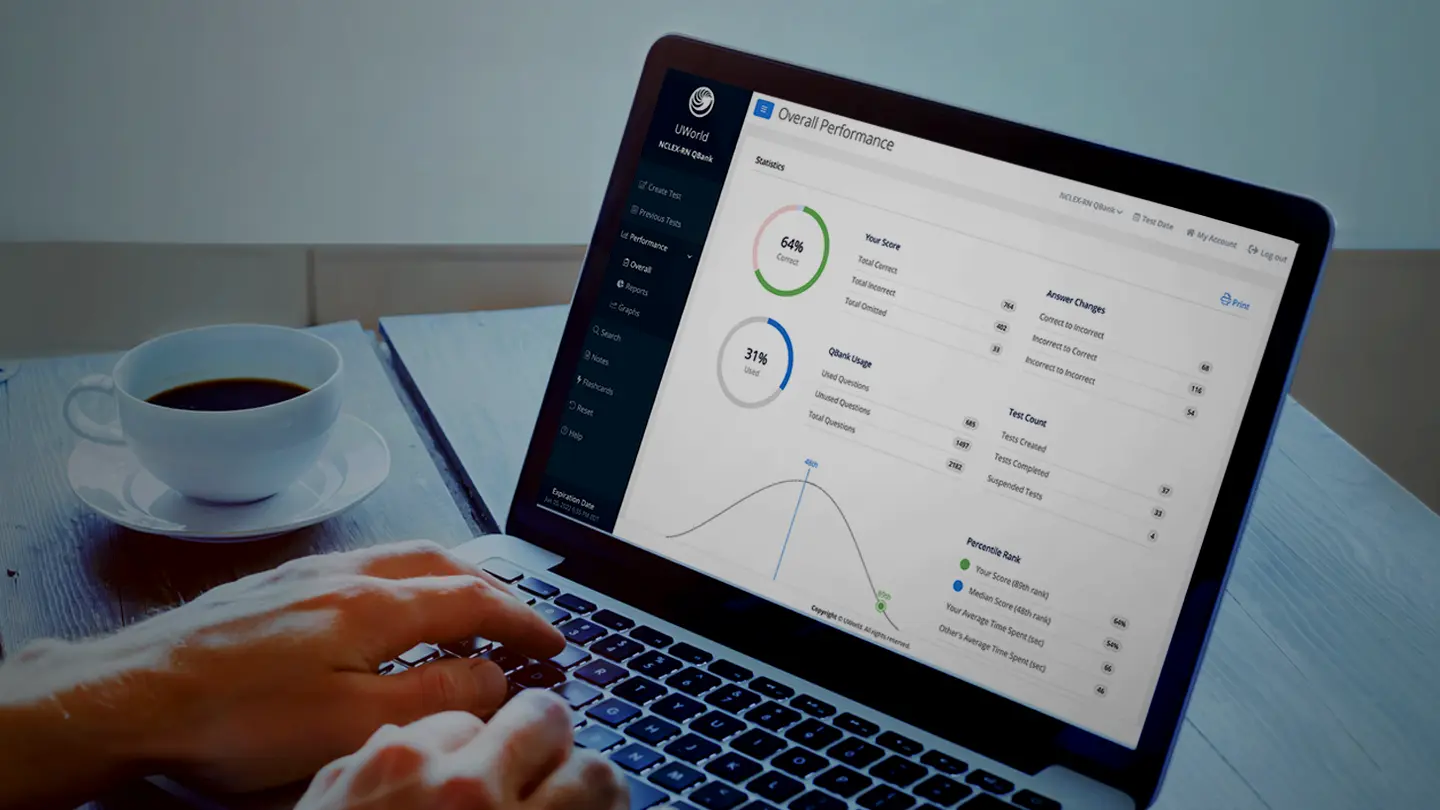
Evidence-Based Study Techniques:
- Use comprehensive NCLEX question banks like UWorld NCLEX-RN, Archer Review CAT, or Kaplan NCLEX with detailed rationales and performance analytics to simulate the actual computerized adaptive testing format
- Master Next Generation NCLEX formats including case studies, extended multiple response, matrix multiple response, and bow-tie questions that test clinical judgment and decision-making rather than memorization alone
- Practice adaptive time management with CAT tests and readiness exams using the official NCLEX Test Plan to understand format and timing strategies
- Target high-yield content areas through SimpleNursing NCLEX Study Plans and focus on clinical reasoning, prioritization, and delegation scenarios that appear frequently on the exam
- Take regular comprehensive practice tests using NCLEX-style questions that mimic the format and style of the actual exam, aiming for consistent improvement in performance analytics and clinical judgment skills
Frequently Asked Questions About NCLEX Question Count
How many questions do most people get on the NCLEX?
Most NCLEX candidates receive between 85–120 questions, though the exact number depends on individual performance.
Is it good if NCLEX shuts off at 85 questions?
Yes! If your NCLEX stops at 85 questions, it typically means you performed very well and the computer was confident in your ability level.
Can you fail NCLEX at 85 questions?
Yes, you can both pass or fail at 85 questions. The number of questions alone doesn't determine pass/fail — your performance level does.
What if I get all 150 questions on NCLEX?
Getting 150 questions means your performance was close to the passing line, and the computer needed the maximum number of questions to make a final determination.
How long does the NCLEX take on average?
The average completion time is 2–4 hours, but you are allowed up to 5 hours to finish the exam, including optional breaks.
What is the minimum number of questions required to pass?
You can pass with as few as 85 questions, which is the minimum possible if you demonstrate clear competency early in the exam.
What’s the typical first-time pass rate?
The first-time pass rate for RN candidates is approximately 85–90%, showing that most well-prepared candidates succeed on their first attempt.
NCLEX Test Day Strategies: Maximize Your Success
Before the Exam
- Take NCLEX practice tests with CAT format
- Time yourself strictly - you have 5 hours maximum
- Study all content areas equally
- Practice clinical judgment questions
During the Exam
- Don't count questions - focus on each individual question
- Expect harder questions - it's often a good sign!
- Manage your time - aim for 1-2 minutes per question
- Stay calm - trust the adaptive process
Understanding Question Difficulty Patterns
- Easy questions early: You're likely performing well
- Very hard questions: Computer is testing your upper limits
- Mix of difficulties: Normal progression for most candidates
Master the NCLEX: Your Path to Nursing Success
Now that you understand how many questions are on the NCLEX and how the CAT system works, you're better prepared for success. Remember:
- Question count varies from 85-150 based on your performance
- CAT technology adapts to your ability level in real-time
- Focus on preparation quality, not just quantity
- Trust the process - harder questions often indicate good performance
Ready to ace your NCLEX? Start with comprehensive practice questions, master clinical reasoning skills, and approach test day with confidence. Your nursing career awaits!